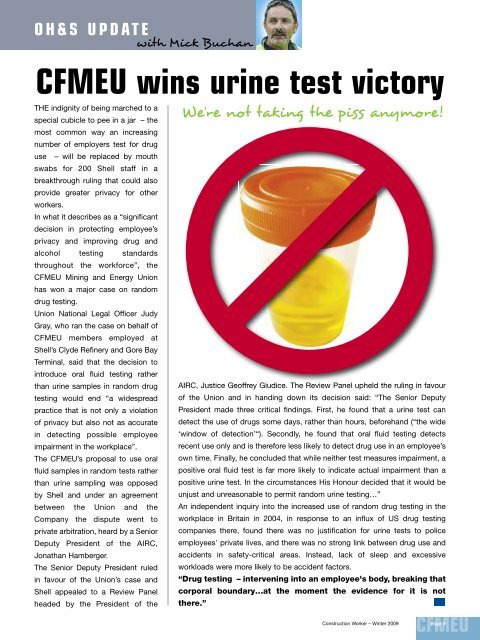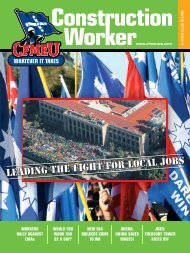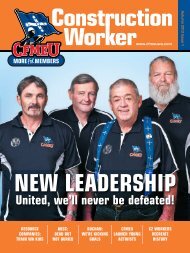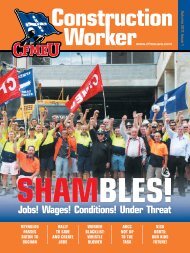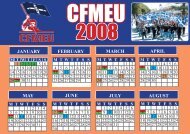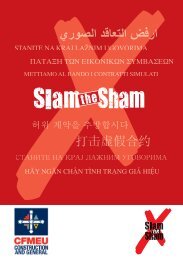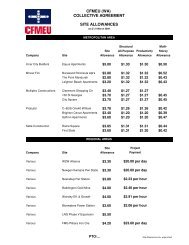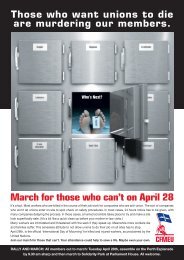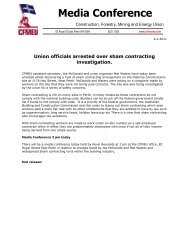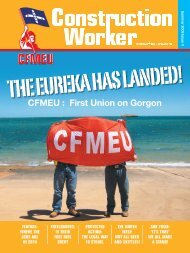Winter Issue 2009 - cfmeu
Winter Issue 2009 - cfmeu
Winter Issue 2009 - cfmeu
You also want an ePaper? Increase the reach of your titles
YUMPU automatically turns print PDFs into web optimized ePapers that Google loves.
O H & S U P D AT E<br />
with Mick Buchan<br />
CFMEU wins urine test victory<br />
THE indignity of being marched to a<br />
special cubicle to pee in a jar – the<br />
most common way an increasing<br />
number of employers test for drug<br />
use – will be replaced by mouth<br />
swabs for 200 Shell staff in a<br />
breakthrough ruling that could also<br />
provide greater privacy for other<br />
workers.<br />
In what it describes as a “significant<br />
decision in protecting employee’s<br />
privacy and improving drug and<br />
alcohol testing standards<br />
throughout the workforce”, the<br />
CFMEU Mining and Energy Union<br />
has won a major case on random<br />
drug testing.<br />
Union National Legal Officer Judy<br />
Gray, who ran the case on behalf of<br />
CFMEU members employed at<br />
Shell’s Clyde Refinery and Gore Bay<br />
Terminal, said that the decision to<br />
introduce oral fluid testing rather<br />
than urine samples in random drug<br />
testing would end “a widespread<br />
practice that is not only a violation<br />
of privacy but also not as accurate<br />
in detecting possible employee<br />
impairment in the workplace”.<br />
The CFMEU’s proposal to use oral<br />
fluid samples in random tests rather<br />
than urine sampling was opposed<br />
by Shell and under an agreement<br />
between the Union and the<br />
Company the dispute went to<br />
private arbitration, heard by a Senior<br />
Deputy President of the AIRC,<br />
Jonathan Hamberger.<br />
The Senior Deputy President ruled<br />
in favour of the Union’s case and<br />
Shell appealed to a Review Panel<br />
headed by the President of the<br />
We’re not taking the piss anymore!<br />
AIRC, Justice Geoffrey Giudice. The Review Panel upheld the ruling in favour<br />
of the Union and in handing down its decision said: “The Senior Deputy<br />
President made three critical findings. First, he found that a urine test can<br />
detect the use of drugs some days, rather than hours, beforehand (“the wide<br />
‘window of detection’“). Secondly, he found that oral fluid testing detects<br />
recent use only and is therefore less likely to detect drug use in an employee’s<br />
own time. Finally, he concluded that while neither test measures impairment, a<br />
positive oral fluid test is far more likely to indicate actual impairment than a<br />
positive urine test. In the circumstances His Honour decided that it would be<br />
unjust and unreasonable to permit random urine testing…”<br />
An independent inquiry into the increased use of random drug testing in the<br />
workplace in Britain in 2004, in response to an influx of US drug testing<br />
companies there, found there was no justification for urine tests to police<br />
employees' private lives, and there was no strong link between drug use and<br />
accidents in safety-critical areas. Instead, lack of sleep and excessive<br />
workloads were more likely to be accident factors.<br />
“Drug testing – intervening into an employee's body, breaking that<br />
corporal boundary…at the moment the evidence for it is not<br />
there.”<br />
Construction Worker – <strong>Winter</strong> <strong>2009</strong> Page 9<br />
CFMEU


